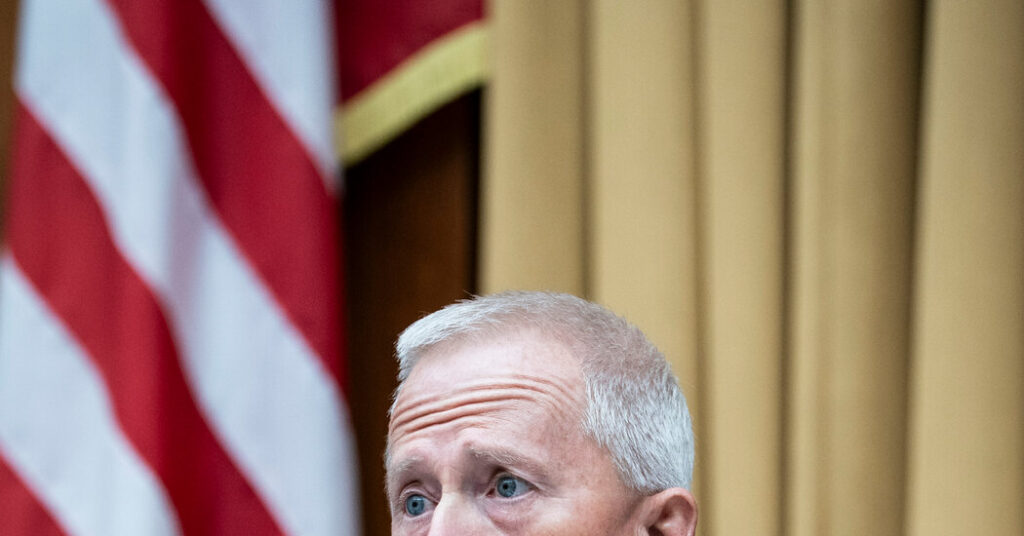Representative Jen Kiggans, Republican of Virginia, once called for eliminating the Affordable Care Act.
Representative Mike Lawler, Republican of New York, has repeatedly called it “a disaster.”
But the two are part of a small group of G.O.P. members of Congress — most of them facing tough re-election races next year in competitive districts — who have broken with their party to push for a temporary extension of a crucial piece of the law: subsidies, currently slated to expire at the end of the year, to help Americans afford their premiums.
Their eagerness to vote for an extension, which was Democrats’ main demand in the weekslong government shutdown fight, underscores how entrenched the health care law has become, even among Republicans who once fought to kill it. And it helps explain why President Trump, who has long railed against the law, commonly called Obamacare, is said to be weighing such a move as he and his party toil to address affordability issues that could be a major liability for them going into the midterm elections.
Letting the subsidies lapse would put a heavy financial burden on millions of voters just as the G.O.P. is grasping to keep control of Congress.
But Mr. Trump’s decision this week to delay the release of his plan also reflects deep divisions among Republicans about embracing a program that many of them have spent their careers attacking and working to undo.
G.O.P. leaders in Congress, like most members in their party, are vehemently opposed to extending the subsidies. And Speaker Mike Johnson, who has called them “a boondoggle,” has shown little enthusiasm for bringing up such a measure in the House, where Republicans typically refuse to consider any legislation that does not have the backing of the majority of their members.
The issue is slated to come to a head in the coming weeks in the Senate, where Senator John Thune, Republican of South Dakota and the majority leader, promised Democrats a December vote on extending the subsidies as part of the deal to end the shutdown.
In the House, the talks among the small cadre of Republican proponents of a subsidy extension have centered on a roughly two-year patch that would prevent the sharpest premium cost spikes while adding conditions designed to satisfy conservative concerns, according to three people participating in the confidential discussions who detailed them on the condition of anonymity.
“The way I look at it, these voters who are going to face increasing premiums obviously did nothing wrong,” Representative Jeff Van Drew, Republican of New Jersey, said in an interview. Mr. Van Drew is among the 13 House Republicans who last month wrote a letter to party leaders urging them to address the issue. “And we owe it to our constituents, and we owe it to them to come up with a solution.”
He said that until his party was ready to present a better plan, they must act at least temporarily to preserve the tax credits that bolster the current law.
“I don’t like Obamacare,” Mr. Van Drew said, calling it too expensive and profitable for insurers. “But — there’s a big but with that — if we’re not ready, then we need to, for a year or a year and a half, renew the subsidy.”
The Affordable Care Act, enacted in 2010, created subsidies, including tax credits, to help uninsured people buy health insurance. In 2021, during the coronavirus pandemic, Congress enhanced the subsidies, providing more help for low- and middle-income enrollees and removing the income cap so some higher-earning households could qualify for help — and then extended them again at that higher level in 2022. If they expire as scheduled at year’s end, many of those same households will see a double hit: premiums that have increased and federal assistance that shrinks or disappears.
Republicans say they have been inundated with calls and emails from constituents sharing their stories of how annual premiums could jump by tens of thousands of dollars in the new year. Mr. Van Drew recounted talking with a small-business owner whose yearly premium would rise to $34,000 from $16,000.
“They can’t do that. We can’t expect them to do that,” he said. “It’s not these people’s fault.”
The potential sticker shock is particularly acute in swing districts where marketplace enrollment is high and household budgets are already strained. Several of the Republicans pushing for a deal represent such areas and face difficult re-election races.
During the recent shutdown fight, the group wrote to Mr. Johnson urging him to pivot “immediately” to the expiring A.C.A. subsidies once the government reopened. In the letter last month, the group warned that letting the tax credits lapse “would risk real harm” to families in their districts, and said Republicans must “chart a conservative path” to prevent steep premium spikes.
Several of the lawmakers pushing hardest for an extension have long criticized the health law. Ms. Kiggans, who called at a candidate forum in 2022 for the elimination of Obamacare, said in a statement last month that “millions of Americans are facing steep premium hikes” without quick action.
Mr. Lawler, who even before arriving in Congress in 2023 railed against the law, said recently that he supported an extension but wanted income thresholds narrowed, maintaining in a social media post that “someone making $600,000 should not be subsidized by the taxpayer.”
Representative Thomas H. Kean Jr., Republican of New Jersey, who voted against codifying A.C.A. protections as a state legislator, has also signaled support for an extension, saying in a social media post that he was working with colleagues “on both sides of the aisle to address rising health-care costs.”
During the shutdown, Mr. Trump and Republican leaders in Congress repeatedly asserted that extending the enhanced subsidies would merely pad the bottom lines of insurers, a message they amplified for weeks as the stalemate dragged on. But that message has quieted somewhat as the Dec. 15 enrollment deadline for coverage beginning in the new year approaches and pressure builds inside their party to address the looming premium spikes.
But skepticism among Republicans remains deep. Representative Andy Harris, Republican of Maryland and the chairman of the House Freedom Caucus, has questioned why Republicans should “salvage a failing Obamacare structure” and warned against “rushing to extend subsidies without real reform.”
Robert Jimison covers Congress for The Times, with a focus on defense issues and foreign policy.
The post Once Foes of Obamacare, Some Republicans Push to Protect It appeared first on New York Times.




